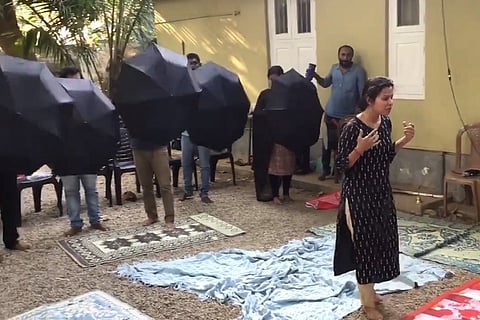

“According to the National Mental Health Survey of India 2017, Kerala is witnessing an alarming rate of mental illness. This project – called MeHeLP – is to look at how people in rural and urban communities construct mental health literacy. This is not about implementing a western model of mental health in Kerala. It is about how we can work with communities and how social norms and faith contribute to the construction of mental health literacy in Kerala,” says Dr Raghu, who is originally from Palakkad but has been living in the UK for 40 years now.
Dr Raghu and a team of scholars from the UK and India are working with two nonprofit organisations which work in the mental health sector: the MEHAC Foundation in Kochi and the Mental Health Action Trust in Kozhikode. The team is also collaborating with the Kochi-based theatre company Lokadharmi.
8 different plays for 8 localities
In this first phase of the project they are working on two localities each in four districts – Ernakulam, Palakkad, Kozhikode and Malappuram. They have already covered Ernakulam and Palakkad and are in Kozhikode at the time TNM spoke to Dr Raghu.
Improving #Mentalhealth #Literacy the need of the hour in #Kerala. #faith #healing scene from our short #communityengagement play @MeHeLP6 @dmuleicester @DMUresearch @ESRC @flowerstvOnair @SnehaMKoshy @KeralaHealth pic.twitter.com/AxrB5Pzj68
— Raghu Raghavan (@RaghuRaghavan1) February 7, 2020
“We have made 20 minute plays with our theatre partner Lokadharmi. There are eight such pieces of theatre for the eight localities we visit. The stories vary based on culture, religion and other norms. We are retelling the stories of the individuals we had met earlier and their families. People identify with the stories, they get emotional and they open up. We get their reaction, and have a dialogue with them. That helps us to understand how we should promote mental health literacy and awareness in the state.”
“Despite the health advances in Kerala, 14.4% of the population aged 18 and above experience mental ill-health once in their lifetime, with 12.5% of individuals with suicidal risk. This is the highest of all the states of India and is almost twice the national rate of 6.4%,” a project report that the doctor shares with us states.
The study further says that this elevated rate is attributed to the high number of people suffering from depression in the state.
“Mental health experts link the rise of depression to Kerala’s fast socioeconomic transformations. These have coincided with decline of the joint family system, discrepancy between high standards of education and low employment, and labour migration to the Gulf States, resulting in ‘gulf depression’ of these migrants and of the women left behind. Moreover, the gap between high expectations, and often harsh socioeconomic realities, the heavy consumption of alcohol, and pressure exerted on children by the school system, also reportedly contribute to depression. In a state well known for its health care and general high development indicators, depression is a challenge,” the report says.
Reaching out to communities
The theatre performances are currently conducted in closed groups which includes only individuals with mental health issues and their immediate families. In the next phase, this is planned to be extended to a larger part of the community to reach out to more people.
Superb #CommunityEngagement through #tribal #dance & #music at #Attappadi #Kerala 4 #MentalHealthAwareness #ruralhealth @KeralaHealth @dmuleicester @mheduNIMHANS @ESRC @ahrcpress @MGMentalHealth @DMUresearch @MoHFW_INDIA @fearlessmotivat @mentalhealthind @MeHeLP6 @mathrubhumi pic.twitter.com/jFJaHEjkUY
— Raghu Raghavan (@RaghuRaghavan1) February 9, 2020
“There would be another eight pieces of theatre when we work with the community – this means about 100 to 200 people in each locality. We get their reaction and then we want to evaluate how to improve mental health literacy. We are also developing short films to spread the message. By October, we want to organise a conference with the government and other legislators. Because there is a policy in place, it is the implementation of the policy (that needs focus),” Dr Raghu says.
He stresses that the idea is not to necessarily medicalise the concept of mental health but to create awareness, “How people can provide support within the family context, the social concept and so on.”
The theatre performances will also help remove the social stigma attached with mental health.
“Despite the psychiatric pluralism, the richness of mental health services and the high HDI, stigma about mental illness is still widespread. In response to societal stigma, people with mental ill-health can internalise public perceptions and become resistant to approach mental health facilities,” says the MeHeLP report.